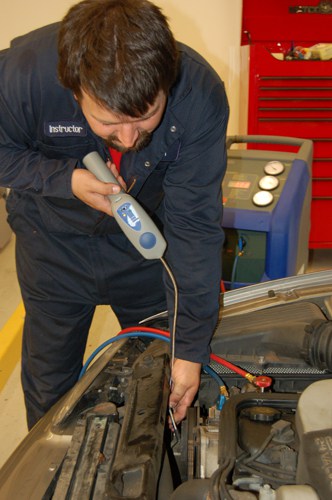Leaking mobile A/C systems are bad for your car and the environment
Motor vehicle air conditioning systems can release refrigerant into the atmosphere in a number of ways:
- Leaks from system part failures and seepage, which occur when a leak is not repaired and the system is recharged or “topped off.”
- Refrigerant released during various service procedures.
- Refrigerant released from service equipment, manifold gauges and equipment hoses.
- When using small cans to charge a system, refrigerant remaining in the can is likely to ultimately be vented.
- The refrigerant remaining in larger (30 pound) disposable containers that has not been recovered is also sometimes vented when they are scrapped.
Checking Mobile A/C Systems for Leaks
The EPA and MACS recommend that leaking systems should be repaired. To pinpoint leaks in mobile A/C systems, MACS recommends that service professionals use the SAE J1628 service procedure.
This requires the use of an electronic leak detector certified to SAE standard J1627 or J2791. As minimum criteria,J1627 electronic leak detectors are capable of identifying leakage rates of 0.5 ounces per year at a distance of 1/4 inch from the leak point.
Another (Big) Reason to Find and Fix Refrigerant Leaks
Loss of refrigerant can reduce oil circulation – even before the low pressure switch or other sensor shuts down power to the compressor clutch. Today’s tight-clearance compressors using HFC-134a are tougher to lubricate, even with the right PAG oil. Compressors that are clutch-less can operate until failure of the drive occurs.
When a vehicle comes into the service shop with a failed compressor and the system is low on refrigerant, just replacing the compressor is not going to fix the apparent leak. It is important to determine if there were multiple leak sources.
Another leaking system part and loss of refrigerant could have caused the compressor failure.
When having your mobile A/C system professionally serviced, insist on proper repair procedures and quality replacement parts. Insist on recovery and recycling so that refrigerant can be reused and not released into the atmosphere.
You can E-mail us at macsworldwide@macsw.org or visit http://bit.ly/cf7az8 to find a Mobile Air Conditioning Society repair shop in your area. Visit http://bit.ly/9FxwTh to find out more about your car’s mobile A/C and engine cooling system.
Many thanks to MACS member and Montgomery County Community College automotive instructor Steve Schaeber for posing for this photo while he was teaching automotive students how to use an electronic leak detector at the MACS training facility in Lansdale, PA. Steve is also a MACS Section 609 proctor.


Leave a Reply